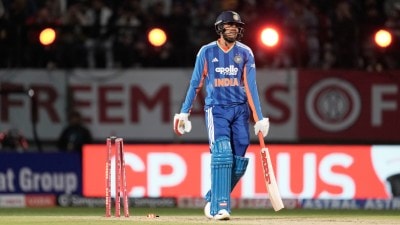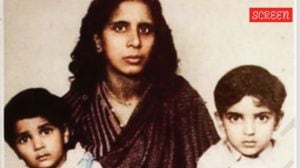British author Fay Weldon, whose novels were a staple in bookstores and libraries around the world, passed away on January 4, 2023 (Wednesday). She left behind a prolific legacy, having written over 30 novels, seven non-fiction books, several short stories and novellas, and various television and radio programmes. In her 2018 book ‘Why Will No One Publish My Novel’, she described herself as a “write-aholic”.
Weldon was a self-declared feminist, despite having run into controversy over her brand of feminism multiple times. In 2017, she told The Guardian that “feminism was a successful revolution, but after a revolution you lose a generation”.

Perhaps her most celebrated novel was ‘The Life and Loves of a She-Devil’ (1983), which dealt with an unattractive woman who tried to take revenge on her adulterous husband and his attractive lover. The novel was adapted into a BBC TV series, as well as a Hollywood film called ‘She-Devil’ (1989), starring Meryl Streep and Roseanne Barr.
‘She-Devil’ would later be loosely adapted into the 1995 Tamil film ‘Sathi Leelavathi’ starring Kamal Haasan, Ramesh Aravind and Kalpana, which would go on to be remade in Hindi as the Salman Khan-Karisma Kapoor-starrer Biwi No 1 (1999), directed by David Dhawan.
Fay Weldon, author
Born Franklin Birkinshaw on September 22, 1931, Weldon spent her childhood in New Zealand and a major portion of her adolescence in England. Her maternal family had a literary streak — her grandfather Edgar Jepson, uncle Selwyn Jepson, and mother Margaret Jepson (under the pseudonym Pearl Bellairs) all wrote novels.
In a blog post, Weldon had described herself as a “plum, cheerful child” who turned into a “plump, frivolous adult”. She added, “I’d be happier to have been seen as a skinny, feisty child, a slim and serious adult, and a handsome octogenarian with an interesting literary past. But that was not to be, despite a lifetime of diets. It was however a state of affairs which made me write a good few novels with overweight, plain women as their heroines. I’ve always been on their side — they are the unseen majority.”
Weldon held a series of odd jobs before she started off on a tangentially literary path — she worked as a clerk in the Foreign Office, writing pamphlets to be air-dropped in Eastern Europe as part of Cold War propaganda. From here, she would branch out into advertising, where she was credited with coining a few slogans that would go on to become part of common British vocabulary.
Story continues below this ad
In 1963, she began her career as a writer for TV and radio, and in 1967, her first novel ‘The Fat Woman’s Joke’ was published. She was successful both as a novelist as well as a screenwriter. She wrote three episodes (including the very first one) for the critically acclaimed British TV series ‘Upstairs, Downstairs’, and also worked on a 1980 BBC miniseries adaptation of Jane Austen’s ‘Pride and Prejudice’, in which she was “slyly rearranging the marital politics of Mr and Mrs Bennet to make him meaner and her more sympathetic”, according to The Guardian.
Her 1978 novel ‘Praxis’, which dealt with a woman who had to take on various roles during her lifetime, ranging from a suburban housewife to a prisoner, was shortlisted for the Booker Prize. The Times recently described the book as “disabusing women of just about every comforting myth they might cling to, firing off savage truths as though it is a novelist’s duty to break three taboos before breakfast”. In 1983, Weldon would be chosen to chair Booker’s judging panel.
‘The Heart of the Country’ (1989) won her The Los Angeles Times Fiction Prize, while ‘Wicked Women’ (1995) received the PEN/Macmillan Silver Pen Award. She was also awarded the Commander of the Most Excellent Order of the British Empire (CBE) in 2001.
One of the most controversial phases of her career was her £18,000 brand-placement deal with the jeweller Bulgari, which resulted in her 2001 novel ‘The Bulgari Connection’. This had scandalised the literary establishment, but she dismissed the criticism. She said that when she first heard about the criticism she thought: “‘Oh, no, dear me, I am a literary author. You can’t do this kind of thing; my name will be mud forever.’ But then after a while I thought, ‘I don’t care. Let it be mud. They never give me the Booker Prize anyway.’”
Story continues below this ad
She was married three times and had four children. The BBC in its obituary quoted American writer Alison Lurie who had likened Weldon to Chaucer’s Wife of Bath: “a storyteller who had been married several times and was practical, funny and wise”. “Many of the stories she tells have the moral of the Wife of Bath’s Tale,” Lurie added. “What women want is their own way. If they get it, they will make men happy; if not, not.”
Fay Weldon’s feminism
The beginning of Weldon’s career coincided with the start of the second wave of feminism, which focused most prominently on issues of equality and discrimination. She often spoke about why she chose to identify as a feminist, and what it meant to be one in her contemporary era.
In a 2013 blog post on her website, she wrote: “What drove me to feminism fifty years ago was the myth that men were the breadwinners and women kept house and looked pretty… That myth finally exploded, and I helped explode it.”
However, Weldon was accused on numerous occasions of betraying the feminist cause. In a 1998 interview with the Radio Times, she said that society “glamorises” rape by classifying the crime as “especially repugnant”. She added that it “isn’t the worst thing that can happen to a woman”, claiming she was speaking from experience. In 2009, she would tell The Guardian that the “feminist push for women’s careers” had actually backfired.
Story continues below this ad
In another interview on the BBC Two show Newsnight in 2017, her comments generated controversy again when she expressed doubts about how much feminism had actually accomplished. “We saw a world of young, healthy, intelligent, striving women. And we didn’t really, honestly, take much notice of those who were not like us,” she said. She added that while feminism had led to a lot of change, not all of it had been “wonderful” for society.
Her novels also showcased this transition from being a staunch feminist to a doubter: her early works of fiction are all assertively feminist while her later books are more varied in their themes and genres.







































